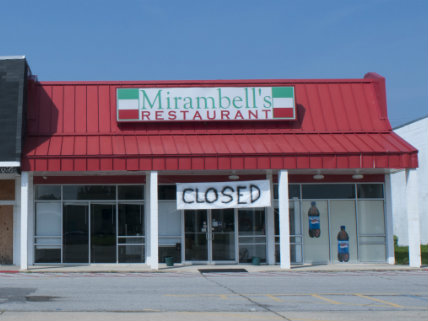Minimum Wage Increases Make Restaurants More Likely to Fail
Every $1 increase in minimum wage makes mid-level restaurants 14 percent more likely to fail, Harvard economists say. Workers, business owners, consumers lose.

Rules that make it more expensive to employ workers will cause fewer workers to be employed. It's a statement that's as true in an economics textbook as it is in the real world—as more than a few places are currently discovering—and a new study from Harvard University economists takes a stab at explaining how that relationship can affect not only workers, but businesses and consumers as well.
As the cost of labor increases, driven by higher minimum wages, there is a greater likelihood that restaurants will go out of business, study authors Michael Luca and Dara Lee Luca conclude. As one might expect, Luca and Luca found that lower quality restaurants—those more likely to rely on low-wage workers—are harder hit by higher wage mandates.
"A one dollar increase in the minimum wage leads to a 14 percent increase in the likelihood of exit for a 3.5-star restaurant (which is a median rating), but has no discernible impact for a 5-star restaurant," they write.
The consequences here are far-ranging. It's unlikely that a worker with no experience is going to get hired at a 5-star restaurant, even for a low-level job, but destroying lower level restaurant jobs makes it harder for those same workers to climb the ladder from working at Outback to working at Fogo de Chão. This is an extension of the more-well-studied effects of minimum wage increases on fast food joints, where higher wages can do even more damage.
Obviously there are consequences for business owners as well. Restaurants have high rate of turnover to begin with, so increasing the likelihood of a mid-level restaurant's failure by 14 percent is no small matter. It may be enough to convince financiers to reallocate their capital towards high-end establishments or into other sectors of the economy, making it harder for anyone who does still want to open a restaurant to find willing partners.
That means fewer choices for consumers. Not everyone can afford to eat at a 5-star restaurant all the time (and, honestly, who would want to?), but higher minimum wages might force some mid-level options out of the market and make it harder for new ones to come online.
Things might be even worse than Luca and Luca suggest. For their study, they used data on restaurants in the San Francisco Bay Area from 2008 through 2016, a period of time that included several municipalities in the region raising their minimum wages. But even before that, the Bay Area was one of the most expensive parts of the country (and already had a higher-than-average minimum wage). If restaurants there were affected to the extent that Luca and Luca suggest, it makes me wonder what the consequences would be in a place like Colusa County, California, where the minimum wage will increase to $15 per hour in a few years. There aren't any 5-star restaurants in Colusa County, as you might guess, and the unemployment rate there, 22.8 percent in February of this year, is already one of the highest in the country.
Indeed, other studies on the consequences of raising minimum wages have found greater consequences. A forthcoming study by researchers at the University of Pennsylvania shows that a 10 percent increase in the minimum wage increases firm exit by approximately 24 percent, according to Luca and Luca.
As an aside, I'd also raise a minor point order about Luca and Luca's decision to title their paper "Survival Of The Fittest," which obviously invokes the theory of evolution, suggesting that there's some sort of natural process at work that's weeding out restaurants unable to compete. That's not really what they are studying, though, because there's nothing natural about these minimum wage increases.
Any vibrant marketplace would look familiar to Darwin, with firms better able to attract customers growing and expanding while those that can't compete struggle to survive. That's perfectly natural. Sudden spikes in mandatory wages are like an invasion of new species—what happened when humans first encountered the dodo, or a cataclysmic event like an asteroid impact—that shocks the system and causes mass extinctions. Species that were surviving and even thriving in the previous environment suddenly disappear without warning.
There's an element of natural selection at play in circumstances like that, sure, but that's hardly the sole explanation.
Unfortunately, we're likely to see more of these sobering conclusions to the recent surge in minimum wages as one of the largest real life economic experiments in American history plays out before our eyes.


Show Comments (89)